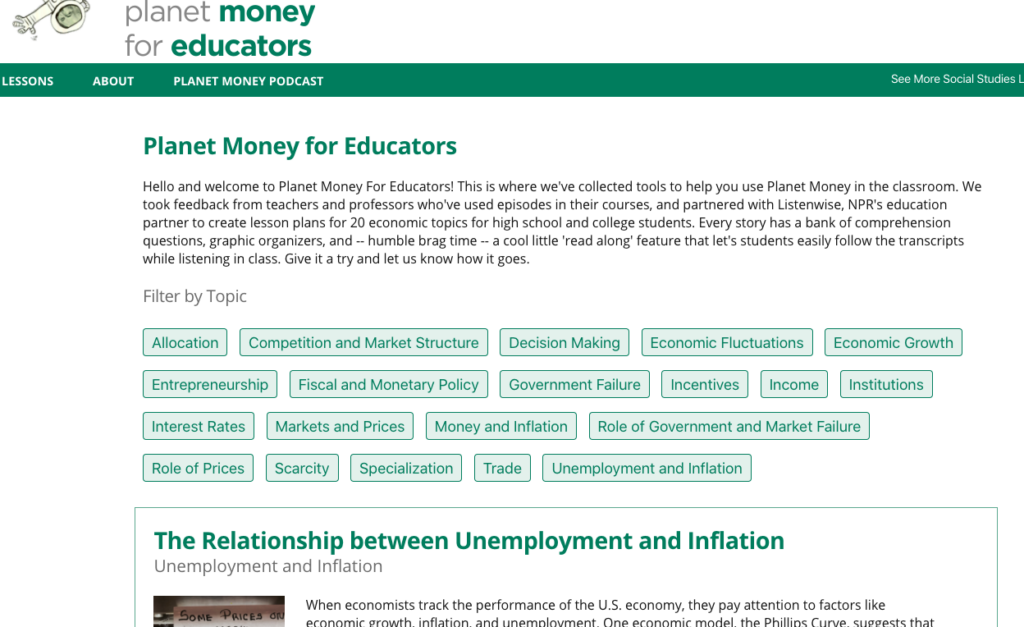Summary:
Guest post by Jeff Mosenkis of Innovations for Poverty Action Planet Money’s new resource for educators pairs podcast episodes with lesson plans, cataloged by topic. It’s a big week for findings from cash studies including: publication of Chris’s study with Fiala and Martinez showing cash benefitted Ugandan participants, but by 9 years later the control group had caught up; Universal Basic Income in Kenya buffered against hard times when COVID and the agricultural lean season hit simultaneously; and a head-to-head-comparison between cash and an employment training program that found neither boosted employment, but cash was more effective at boosting economic outcomes. I summarize and link to them in this thread. On that last one (comparing a traditional program to cash), some nice
Topics:
Jeff Mosenkis (IPA) considers the following as important: cash transfers, democracy, development, Economics, Employment, governance, jobs, links, miscellany, news, Planet Money, podcasts, Poverty, teaching, UBI, universal basic income
This could be interesting, too:
Guest post by Jeff Mosenkis of Innovations for Poverty Action Planet Money’s new resource for educators pairs podcast episodes with lesson plans, cataloged by topic. It’s a big week for findings from cash studies including: publication of Chris’s study with Fiala and Martinez showing cash benefitted Ugandan participants, but by 9 years later the control group had caught up; Universal Basic Income in Kenya buffered against hard times when COVID and the agricultural lean season hit simultaneously; and a head-to-head-comparison between cash and an employment training program that found neither boosted employment, but cash was more effective at boosting economic outcomes. I summarize and link to them in this thread. On that last one (comparing a traditional program to cash), some nice
Topics:
Jeff Mosenkis (IPA) considers the following as important: cash transfers, democracy, development, Economics, Employment, governance, jobs, links, miscellany, news, Planet Money, podcasts, Poverty, teaching, UBI, universal basic income
This could be interesting, too:
Lars Pålsson Syll writes Schuldenbremse bye bye
Lars Pålsson Syll writes What’s wrong with economics — a primer
Lars Pålsson Syll writes Krigskeynesianismens återkomst
Lars Pålsson Syll writes Finding Eigenvalues and Eigenvectors (student stuff)
Guest post by Jeff Mosenkis of Innovations for Poverty Action

Planet Money’s new resource for educators pairs podcast episodes with lesson plans, cataloged by topic.
- It’s a big week for findings from cash studies including: publication of Chris’s study with Fiala and Martinez showing cash benefitted Ugandan participants, but by 9 years later the control group had caught up; Universal Basic Income in Kenya buffered against hard times when COVID and the agricultural lean season hit simultaneously; and a head-to-head-comparison between cash and an employment training program that found neither boosted employment, but cash was more effective at boosting economic outcomes. I summarize and link to them in this thread.
- On that last one (comparing a traditional program to cash), some nice reflections here on how early studies make it easier for government agencies like USAID to take a chance on a new idea, and why a traditional before-and-after USAID evaluation led to a different conclusion than an RCT. Also, more detailed tweetstorm from study co-author Andrew Zeitlin here.
- As it happens, all the data for all these studies was collected by my IPA colleagues in Kenya, Uganda, and Rwanda, and while it’s easy to boil the finding down to a quick phrase, each represents thousands of hours of work behind the scenes, like this example.
- Rohini Pande has a short and very readable article in Science arguing for an increased role in development research for finding ways to help the voices of the poor be heard in the democratic process and encouraging governments to be responsive to their needs. (h/t Michael Eddy)
- A side effect of seminars going online is giving more people access to see them, and the upcoming CEPR Virtual Dev Seminar series looks great, with all-star presenters like Professor Pande above, and Oriana Bandiera
- ICYMI, Planet Money’s had a summer school series where they revisit classic episodes explaining basic principles of econ with Betsey Stevenson and Justin Wolfers. The image above comes from a new teaching resource on a special site – they’ve organized 30 episodes on 20 topics along with lesson plans. It also has a “read along” feature for students to read the transcript while listening. I recommend sharing this teaching resource with anybody you know teaching high school or college econ concepts, basically they’ve already planned out an intro class.
- David Evans and Amina Mendez Acosta have a very short and digestible summary of lessons from 140 education studies in Africa.
- An update on the finding that the Heckman Curve (the idea that earlier interventions in childhood are more cost effective), doesn’t appear to be the case, according to a more comprehensive assessment of programs from Washington State (full academic paper). This should be encouraging that there can be cost-effective interventions for kids at all ages.
- If you’re studying land tenure or government expropriation of agricultural land, the case of Black farmers in the United States is a good example. A combination of explicit violence, informal discrimination (as I understand it, such as a local bank “losing” a mortgage payment), and outright government discrimination, such as the USDA denying agricultural loans to black farmers (and even when they won a lawsuit, taking 11 years to pay out), reduced the amount of land farmed by Black farmers in the US by 90% between 1910 and 1997 according to this article.
